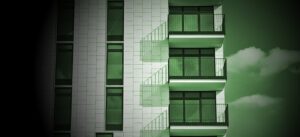VertPro® Energy Benchmarking Platform
California Balcony Inspection Compliance Assistance
California Balcony Inspections Deadlines Starting: Jaunaury 1, 2025
More Information
California Senate Bill 326 & 721
SB721:
Hill. Building standards: decks and balconies: inspection.
Existing law provides authority for an enforcement agency to enter and inspect any buildings or premises whenever necessary to secure compliance with or prevent a violation of the building standards published in the California Building Standards Code and other rules and regulations that the enforcement agency has the power to enforce.

This bill would require an inspection of exterior elevated elements and associated waterproofing elements, as defined, including decks and balconies, for buildings with 3 or more multifamily dwelling units by a licensed architect, licensed civil or structural engineer, a building contractor holding specified licenses, or an individual certified as a building inspector or building official, as specified. The bill would require the inspections, including any necessary testing, to be completed by January 1, 2025, with certain exceptions, and would require subsequent inspections every 6 years, except as specified. The bill would require the inspection report to contain specified items and would require that a copy of the inspection report be presented to the owner of the building within 45 days of the completion of the inspection and would require copies of the reports to be maintained in the building owner’s records for 2 inspection cycles, as specified. The bill would require that if the inspection reveals conditions that pose an immediate hazard to the safety of the occupants, the inspection report be delivered to the owner of the building within 15 days and emergency repairs be undertaken, as specified, with notice given to the local enforcement agency. The nonemergency repairs made under these provisions would be required to be completed within 120 days, unless an extension is granted by the local authorities. The bill would authorize local enforcement agencies to recover enforcement costs associated with these requirements. The bill would require the local enforcement agency to send a 30-day corrective notice to the owner of the building if repairs are not completed on time and would provide for specified civil penalties and liens against the property for the owner of the building who fails to comply with these provisions. The bill would exclude a common interest development, as defined, from these provisions. The bill would require any building subject to these provisions that is proposed for conversion to condominiums to be sold to the public after January 1, 2019, to have the required inspection conducted prior to the first close of escrow of a separate interest in the project, and would require the inspection report and written confirmation by the inspector that any recommended repairs or replacements have been completed to be submitted to, among others, the Department of Real Estate and included in certain required statements and reports, as specified. The bill would authorize a local governing entity to enact stricter requirements than those imposed by these provisions.
SB326:
Hill. Common interest developments.
The Davis-Stirling Common Interest Development Act governs the management and operation of common interest developments. Existing law also sets forth the duties and responsibilities of the association and the owners of the separate interests with regard to maintenance and repair of common and exclusive use areas, as defined. Unless otherwise provided in the common interest development declaration, the association is generally responsible for maintaining, repairing, and replacing the common area, and the owner of each separate interest is responsible for maintaining that separate interest and any exclusive use common area appurtenant to that interest.
This bill would require the association of a condominium project to cause a reasonably competent and diligent visual inspection of exterior elevated elements, defined as the load-bearing components and associated waterproofing systems, as specified, to determine whether the exterior elevated elements are in a generally safe condition and performing in compliance with applicable standards. The bill would require the inspector to submit a report to the board of the association providing specified information, including the current physical condition and remaining useful life of the load-bearing components and associated waterproofing systems. The bill would require the inspector to provide a copy of the inspection report to the association immediately upon completion of the report, and to the local code enforcement agency within 15 days of completion of the report, if, after inspection of any exterior elevated element, the inspector advises that the exterior elevated element poses an immediate threat to the safety of the occupants. The bill would require the association to take preventive measures immediately upon receiving the report, including preventing occupant access to the exterior elevated element until repairs have been inspected and approved by the local enforcement agency. The bill would authorize local enforcement agencies to recover enforcement costs associated with these requirements from the association. The bill would authorize the association board to enact rules or bylaws imposing requirements greater than those imposed by these provisions.
The act provides that an association has standing to institute, defend, settle, or intervene in litigation, arbitration, mediation, or administrative proceedings in its own name as the real party in interest and without joining with its members in specified matters, including enforcement of the governing documents.
The bill would provide that, subject to compliance with other specified provisions described below, and notwithstanding any provision to the contrary in the governing documents, a board has the authority to commence legal proceedings against a declarant, developer, or builder of a common interest development, except as specified. The bill would, with certain exceptions, prohibit an association’s governing documents from limiting a board’s authority to commence legal proceedings against a declarant, developer, or builder of a common interest development. The bill would make these provisions applicable to governing documents, irrespective of when they were recorded, and claims initiated before the effective date of this bill, except if those claims have been resolved through an executed settlement, a final arbitration decision, or a final judicial decision on the merits.
The act requires the board, prior to the filing of certain civil actions by the association against the declarant or developer, or within 30 days of filing the civil action if the association has reason to believe that the applicable statute of limitations will expire before the association files the civil action, to provide members of the association a written notice specifying, among other things, that a meeting will take place to discuss problems that may lead to the filing of a civil action.
Sign up for a free consultation above on our calendar. For any questions,
you may reach me at Kevin.Sullivan@VertEnergyGroup.com or give me a call at (949) 200-7728.


